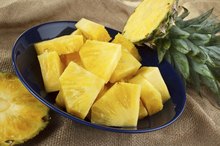Foods Containing Protease Enzymes
Proteolytic enzymes, also called proteases, are a group of enzymes that help break down and assimilate protein in the digestive system, according to the EBSCO Health Library website. Although protease is produced naturally by the body, food sources also contain these enzymes. People with protolytic enzyme deficiencies can sometimes use these foods to boost protease levels and help their bodies more efficiently use proteins for energy.
Pineapple
Pineapple is a fruit that is native to Uruguay and Brazil, but it is now grown in other areas, including southern Florida, California, Hawaii and Guam, according to the California Rare Fruit Growers website. The pineapple has a tough, waxy rind that protects the cylindrical fruit inside. This fruit can be eaten by itself or used in smoothies, pork dishes and other foods. According to the EBSCO Health Library website, pineapple contains a form of protease called bromelain that may help the body break down proteins in foods. Bromelain supplements are typically made from the stem of the pineapple.
Papaya
What Fruits Contain Protease Enzymes?
Learn More
While the papaya plant is commonly thought of as a tree, it is actually a large herb that can grow up to 30 feet tall, notes the Purdue University website. It is thought to be native to southern Mexico and Central America, although the papaya is now grown in the Bahamas, Philippines, Bermuda, India and other warm areas. Papaya is most often eaten by itself, although it is also an ingredient in some types of ice creams and marmalades. According to the EBSCO Health Library website, papaya contains a proteolytic enzyme called papain.
Whole Grains
Whole grains are rich sources of protease, according to Paula Figoni, author of "How Baking Works: Exploring the Fundamentals of Baking Science." Whole grain sourdough breads are particularly high in proteolytic enzymes because they are acidic and have low pH levels, which supports increased protease activity. Rye flour is also rich in protease. White breads, which typically do not include protease-rich wheat bran, are not considered good sources of proteolytic enzymes.
Related Articles
References
- EBSCO Health Library: Proteolytic Enzymes
- Purdue University: Papaya; J. Morton; 1987
- "How Baking Works: Exploring the Fundamentals of Baking Science"; Paula Figoni; 2008
Writer Bio
Owen Pearson is a freelance writer who began writing professionally in 2001, focusing on nutritional and health topics. After selling abstract art online for five years, Pearson published a nonfiction book detailing the process of building a successful online art business. Pearson obtained a bachelor's degree in art from the University of Rio Grande in 1997.









